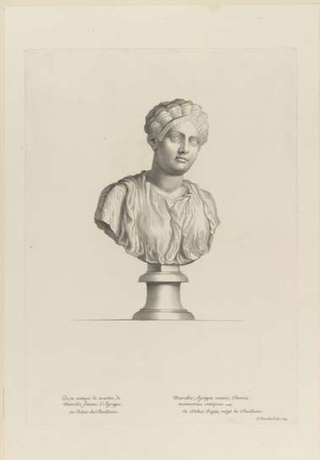Related Research Articles

AD 14 (XIV) was a common year starting on Monday of the Julian calendar. At the time, it was known as the Year of the Consulship of Pompeius and Appuleius. The denomination AD 14 for this year has been used since the early medieval period, when the Anno Domini calendar era became the prevalent method in Europe for naming years.

Publius Quinctilius Varus was a Roman general and politician under the first Roman emperor Augustus. Varus is generally remembered for having lost three Roman legions when ambushed by Germanic tribes led by Arminius in the Battle of the Teutoburg Forest, whereupon he killed himself.

Gnaeus Domitius Ahenobarbus was a member of the imperial Julio-Claudian dynasty of Ancient Rome. Domitius was the son of Antonia Major. He married Agrippina the Younger and became the father of the emperor Nero.
Aemilia Lepida is a Latin feminine given name that was given to the daughters of various Aemilius Lepiduses, men belonging to the Lepidus branch of the Aemilia gens (family) that was founded by the Marcus Aemilius Lepidus who served as consul in 285 BC. The Aemila Lepidas who appear in Roman historians were principally known for their engagements and marriages, with those in the late Republic and early Empire related to the Julio-Claudian dynasty.

Scribonia was the second wife of Octavian, later the Roman Emperor Augustus, and the mother of his only biological child, Julia the Elder. Through her youngest daughter she was the mother-in-law of the Emperor Tiberius, great-grandmother of the Emperor Caligula and Empress Agrippina the Younger, and great-great-grandmother of the Emperor Nero.

Marcus Claudius Marcellus was the eldest son of Gaius Claudius Marcellus and Octavia Minor, sister of Augustus. He was Augustus' nephew and closest male relative, and began to enjoy an accelerated political career as a result. He was educated with his cousin Tiberius and traveled with him to Hispania where they served under Augustus in the Cantabrian Wars. In 25 BC he returned to Rome where he married his cousin Julia, who was the emperor's daughter. Marcellus and Augustus' general Marcus Vipsanius Agrippa were the two popular choices as heir to the empire. According to Suetonius, this put Agrippa at odds with Marcellus, and is the reason why Agrippa traveled away from Rome to Mytilene in 23 BC.
Sextus Appuleius is the name of four figures during the 1st century BC and 1st century AD. The first Sextus Appuleius was married to Octavia Major, the elder half-sister of Augustus. The three subsequent figures named Sextus Appuleius are respectively the son, grandson and great-grandson of Sextus Appuleius (I) and Octavia Major.
Lucius Antonius was the son of Iullus Antonius and Claudia Marcella Major.
Octavia the Elder was the daughter of the Roman governor and senator Gaius Octavius by his first wife, Ancharia. She was the elder half-sister to Octavia the Younger and Roman Emperor Augustus.
The gens Quinctilia, also written Quintilia, was a patrician family at ancient Rome, dating from the earliest period of Roman history, and continuing well into imperial times. Despite its great antiquity, the gens never attained much historical importance. The only member who obtained the consulship under the Republic was Sextus Quinctilius in 453 BC. The gens produced numerous praetors and other magistrates, but did not obtain the consulship again for over four hundred years.

Claudia Marcella Major (PIR2 C 1102; born some time before 40 BC) was the senior niece of Roman emperor Augustus, being the eldest daughter of his sister Octavia the Younger and her first husband Gaius Claudius Marcellus. She became the second wife of Augustus' foremost general Marcus Vipsanius Agrippa and after that the wife of Iullus Antonius, the son of Mark Antony.
Fabia Numantina was a member of the patrician Fabia gens. Precisely how she fits into this family is not certain; while she is generally believed to be the daughter of Paullus Fabius Maximus and Marcia, a maternal first cousin of Augustus, it is possible that she was the daughter of Paullus' brother, Africanus Fabius Maximus.
Claudia Marcella Minor (PIR2 C 1103, born some time before 39 BC) was a niece of the first Roman emperor Augustus. She was the second surviving daughter of the emperor's sister Octavia the Younger and her first husband Gaius Claudius Marcellus. Marcella had many children by several husbands, and through her son Marcus Valerius Messalla Barbatus she became the grandmother of the empress Messalina.
The gens Appuleia, occasionally written Apuleia, was a plebeian family at ancient Rome, which flourished from the fifth century BC into imperial times. The first of the gens to achieve importance was Lucius Appuleius, tribune of the plebs in 391 BC.
Marcus Appuleius was a nephew of the Roman emperor Augustus and Roman consul in 20 BC with Publius Silius Nerva as his colleague.
Claudia Pulchra (14 BC – AD 26) (PIR2 C 1116) was a Patrician woman of Ancient Rome who lived during the reigns of the Roman emperors Augustus and Tiberius.
Sextus Pompeius was a Roman senator who lived during the 1st century BC and into the 1st century AD. He appeared to have a witty character and to be very intelligent. Sextus was a patron of literature and the Roman poet Ovid addressed to him four poems when he was living in exile. These poems were collected in the fourth book of Epistulae ex Ponto.
Vipsania was an ancient Roman noblewoman of the first century BC. She was married to the politician Publius Quinctilius Varus and was a daughter of Roman general Marcus Vipsanius Agrippa and his second wife Claudia Marcella Major.
Vipsania was an ancient Roman noblewoman of the first century BC. She was married to the politician Marcus Aemilius Lepidus and was likely the daughter of Roman general Marcus Vipsanius Agrippa and his second wife Claudia Marcella Major.